Don't download XNXubd VPN Browser – it's dangerous
Popularity does not equal privacy – use a quality free VPN instead
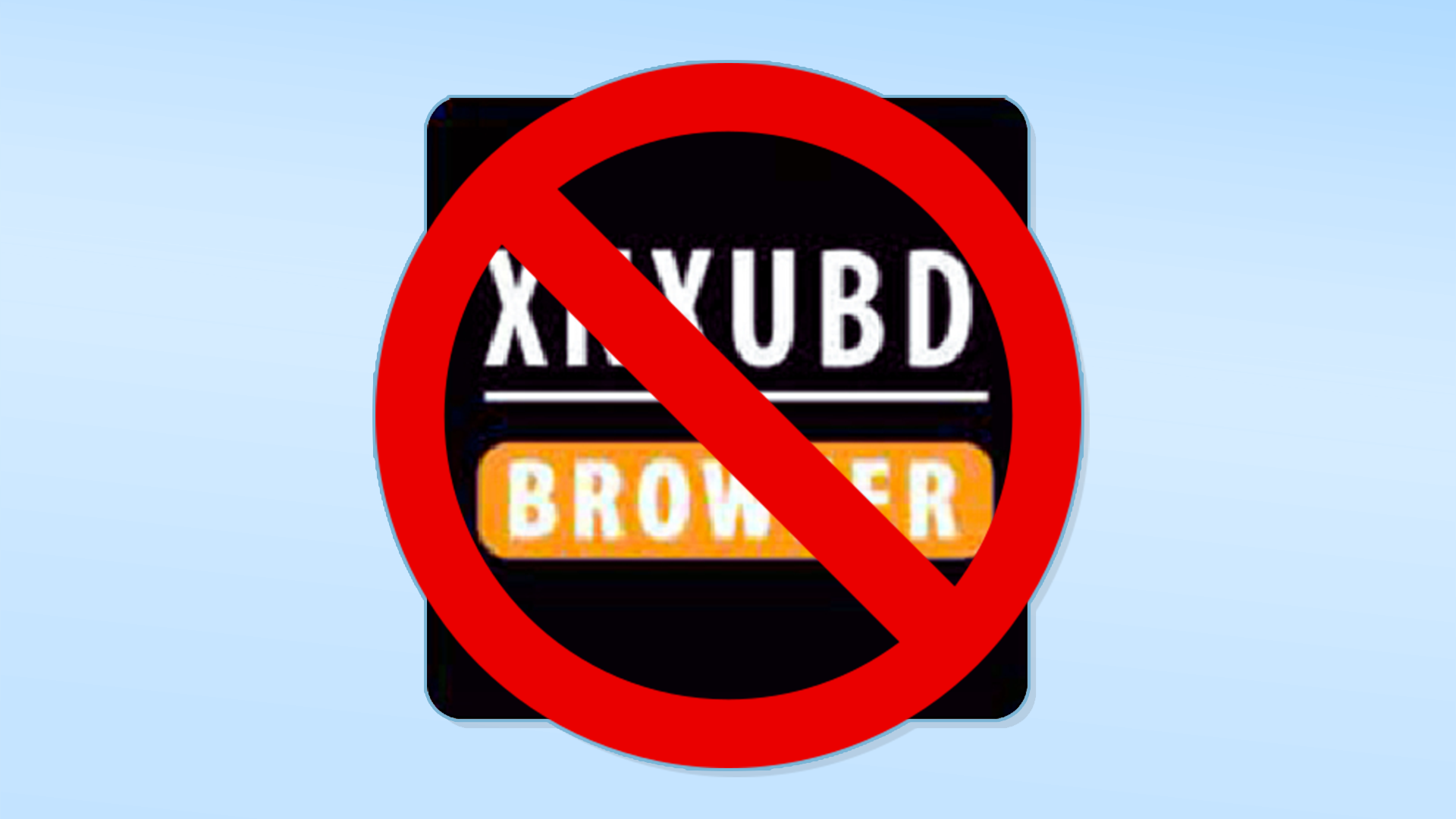
As VPN Editor at Tom's Guide, I'm always on the lookout for promising new providers to review and include in my best VPN guides, and fresh, interesting things to write about in the world of privacy. I use tools that show me the popularity of keywords to gauge if anyone actually wants to read about certain subjects, and this time I spotted something strange.
An app called "XNXubd VPN Browser" started to gain quite a significant search volume about a year ago. Of course, there are new products launching all the time – good and bad – but XNXubd's stratospheric rise in interest stood out to me.
As an aside – and a potential spoiler for the rest of the article – XNXubd VPN featured in my article on 6 popular VPNs you should avoid. It's certainly not the only culprit, but its huge popularity makes it stick out as a real potential threat.
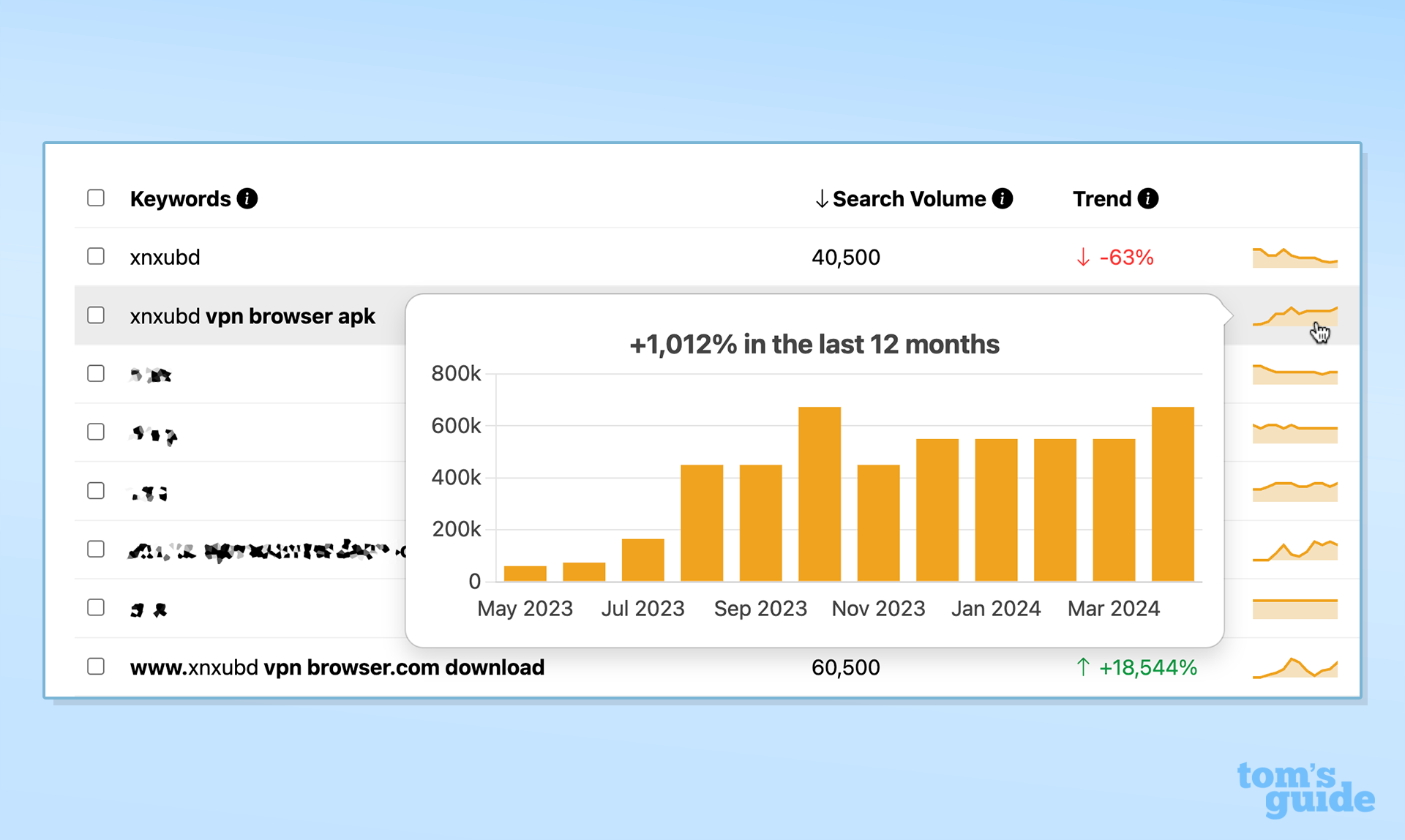
"XNXubd Browser VPN apk" has exploded from less than 100,000 to over 600,000 searches a month, with "XNXubd" and "download" terms also showing significant volume.
I decided to do some digging because I'd never heard of this product before. Let me tell you, I did not like what I found. Searching for it using Google gave me several very dodgy-looking websites, a few of them sharing very similar URLs. The two websites that seemed most legitimate appear pretty similar to most VPN websites, but held some very troubling information. This is the first, and this is the second.
It's worth noting that I think the XNXubd browser does what it says on the tin to a certain extent. After all, the search volume implies that people really want to use it, and even if it's only popular through word of mouth, it has to be doing something right to get there. However, in short, please don't download this app. I'll explain why right here.
I have contacted XNXubd for comment, but have not received a response. I will include the replies here if and when I hear back.

I've been in charge of Tom's Guide's VPN articles since 2020, and in that time I've helped test and review over 100 VPN providers for both Tom's Guide and TechRadar. I strongly believe that privacy, price, and ease of use all go hand in hand to make the very best products.
What is XNXubd VPN Browser?
In short, it appears to be a free browser with an integrated VPN, designed to allow access to blocked sites.
On the website that shows first in Google, it claims to be "a versatile and potent tool that seamlessly amalgamates the functionalities of a VPN (Virtual Private Network) and a web browser." That sounds great. While VPN and browser combinations aren't for everyone, a good example is Opera, which integrates VPN features into its browser and can be very useful.
XNXubd promises a "serene browsing experience, untroubled by the shadows of surveillance," and claims to protect you from "potential threats such as hackers, identity thieves, and evil entities." Excellent! That's exactly what I want from my browser and VPN combo.
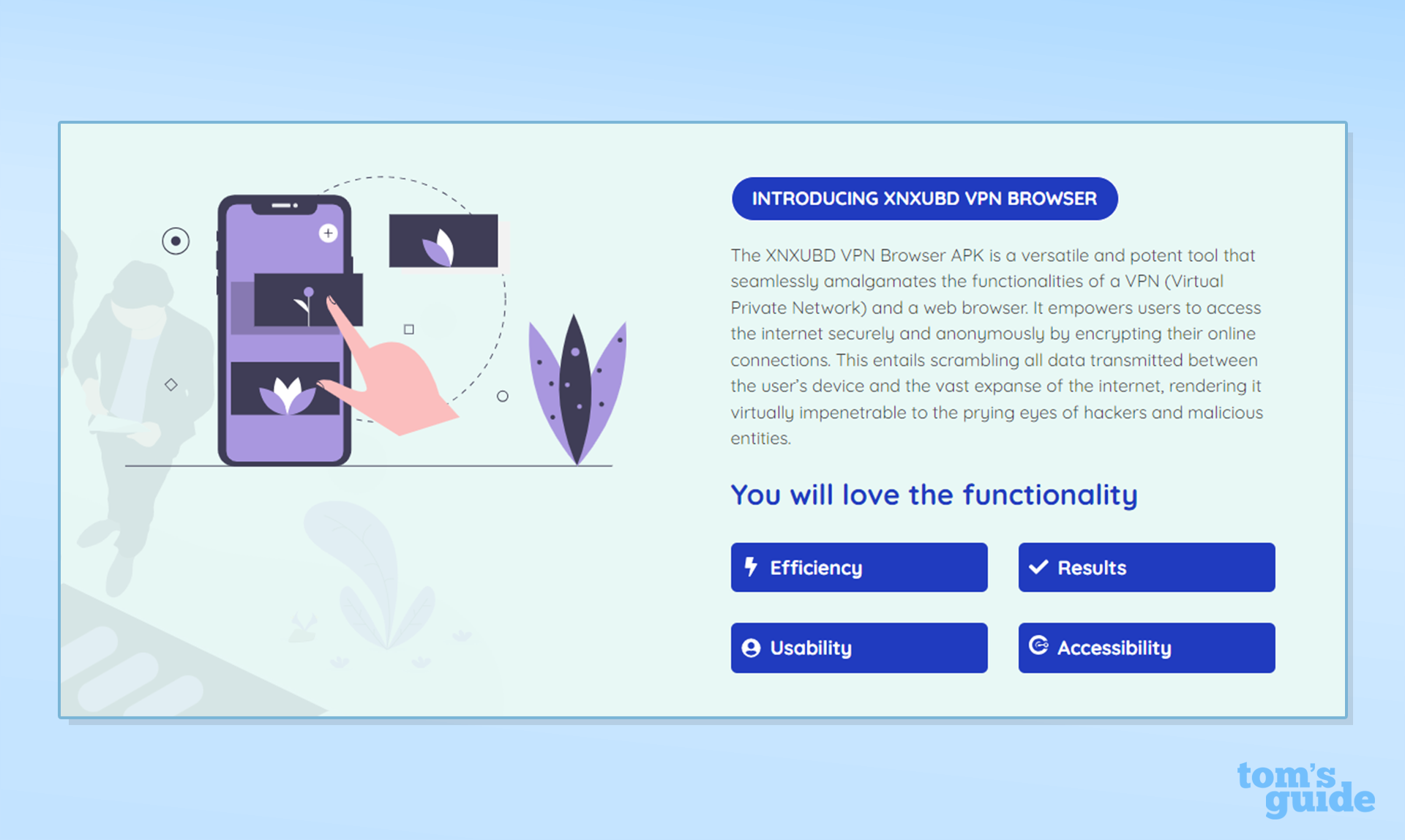
However, the first major red flag – aside from the janky website – is the fact that it doesn't direct you to the Play Store or App Store to download it. Rather, one website gives you a direct download, while the other forwards you on to a Google Drive link.
Google is kind enough to tell you that it can't scan the file for safety, but should you ignore that warning, you'd proceed to download the XNXubd VPN Browser .apk file and install it on your device.
In the FAQ section, it answers the question "is it available on Google Play?" with a very elucidating "not yet." Should you be having second thoughts, though, XNXubd offers reassurance and states that the product is "totally safe to use." Just what I want to hear.
Unfortunately for you, no, I did not download the app. But suffice to say, all of this absolutely screams malware to me.
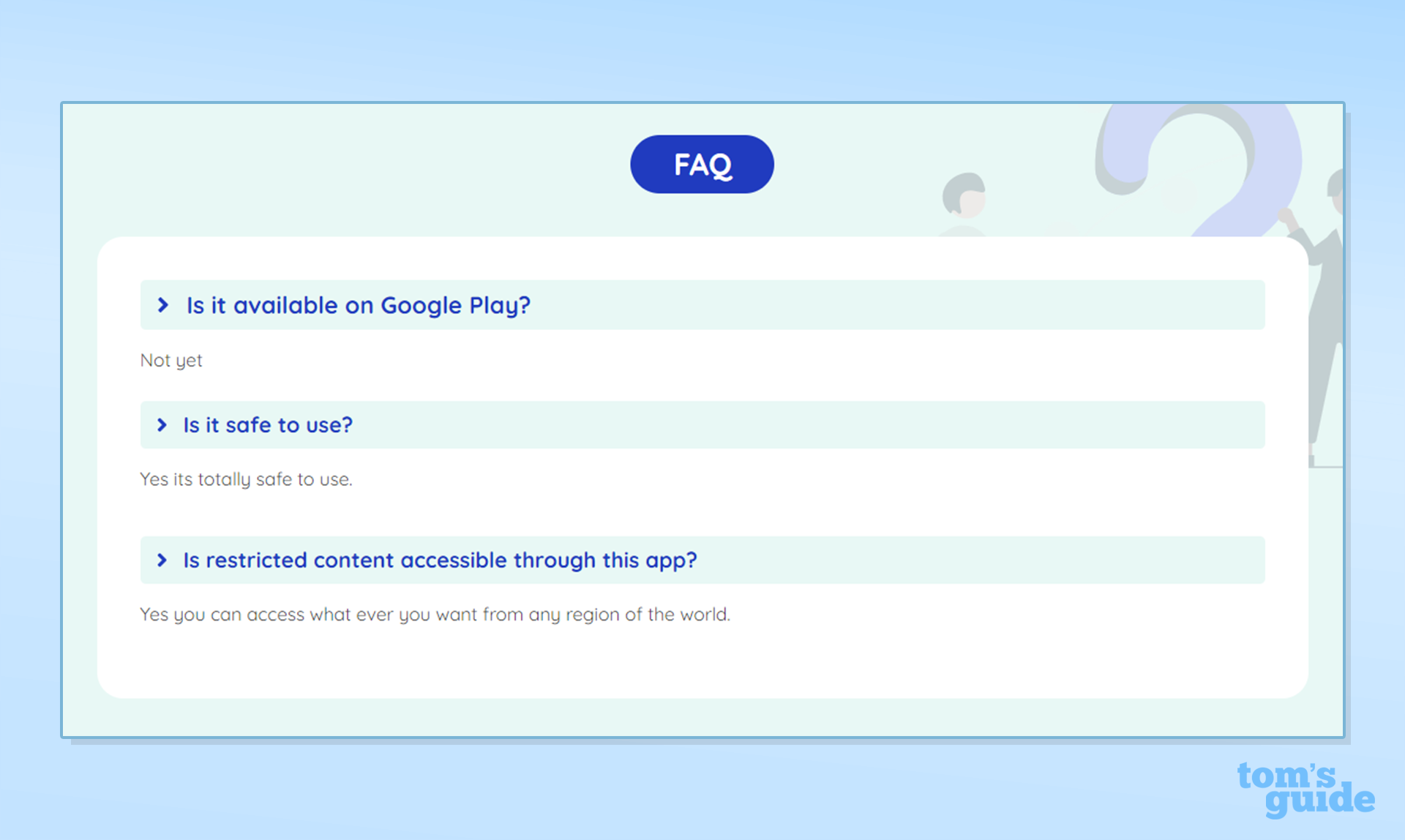
Strangely, there is an "XNXubd VPN: Xxnxx ProxyMax" app on the Play Store which has a staggering 100,000+ downloads. It has fairly good user reviews, averaging at 4/5, and I find the salacious app icon quite amusing. However, I still wouldn't trust it, especially now that Google allows developers to simply state their data collection practices rather than vetting them themselves. The developer is X Proxy, and all this talk about proxies is starting to make me think that XNXubd is a proxy, not a true VPN…
The Apple App Store has a similar result when you search "XNXubd," called "X Browser." However, it only has 49 reviews, hasn't been updated since a bug fix soon after launch, and was developed by an untraceable "Jules Bernavate."
Worryingly, under the "data used to track you" section, it states that X Browser uses usage data and advertising data to track you. No thank you.
Unpicking XNXubd's privacy policy
Remember how I said there were two websites? Well, this is where it gets interesting. On the first, we see that the website is "a free and informational blog based on free information resources from internet [sic]. We do not own or modify any app." So, the privacy policy on the website doesn't apply to any app, only the website's data collection.
The fact that the privacy policy states they collect "internet protocol (IP) addresses, browser type, Internet Service Provider (ISP), date and time stamp, referring/exit pages, and possibly the number of clicks" isn't that sinister – most websites will do much the same. However, the fact that the About Us page is just one big caveat is incredibly suspect.
XNXubd overtly states that it collects your IP address and your browsing activity, and shares it with third parties – all while claiming it's a no-logs VPN. This is a cardinal sin in the privacy world.
The second website, linked through a CrunchBase profile, is a little more explicit, and does not distance itself from the application. On the homepage it claims to be a no-logs VPN, stating that XNXubd is "logs-free and unaware of your activity." That's perfect – but does the privacy policy back it up?
When we head through to the policy, we find our smoking gun:
"When you use our service, we may collect certain types of information, including:
- Personal Data: This includes information that can identify you, such as your email address.
- Usage Data: We automatically collect data about your device and how you interact with our service, such as your IP address, browser type, and the pages you visit."
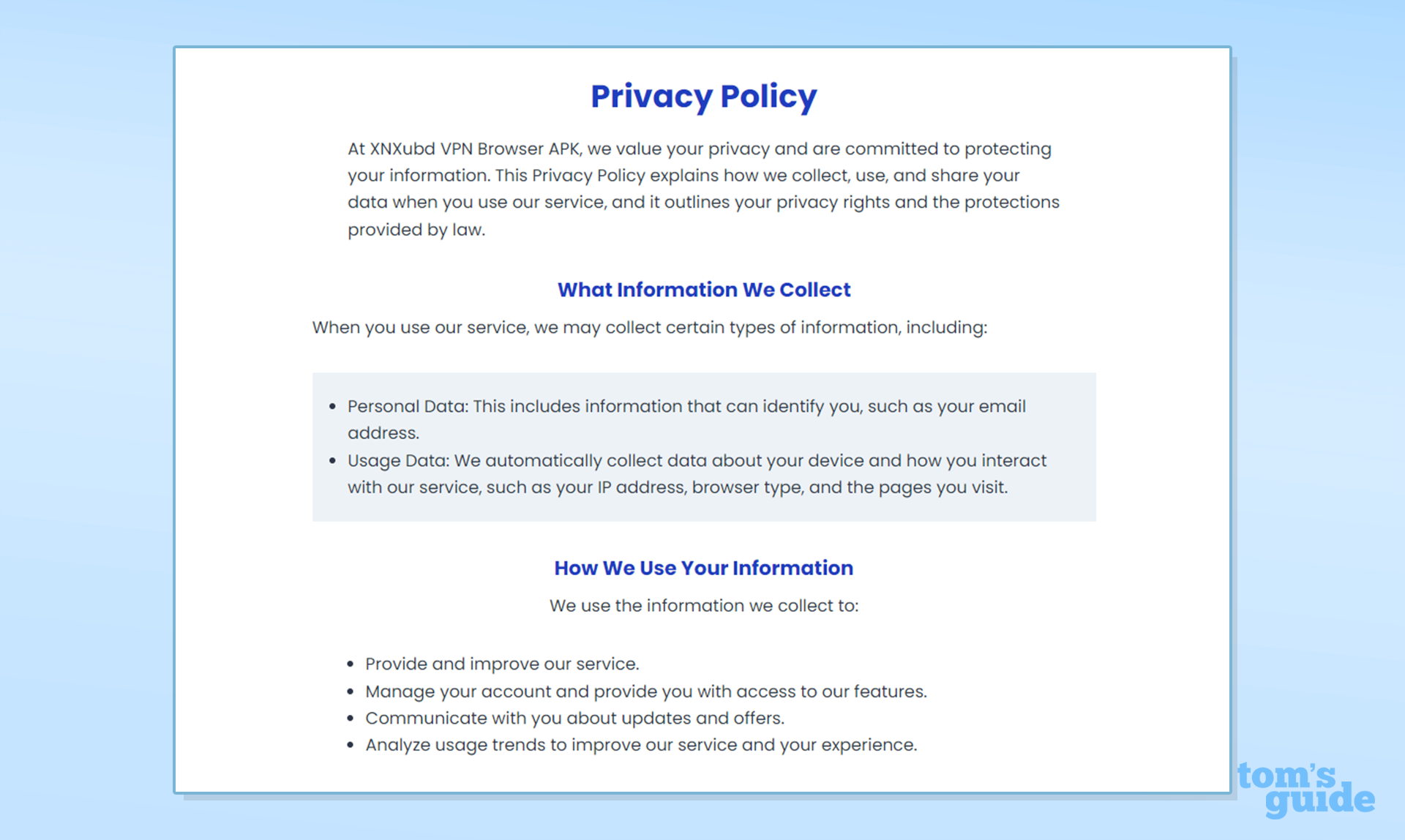
So, not only does, XNXubd VPN Browser collect your activity as well as your IP address, but it also falsely claims to be a no-logs VPN. I'd never use a VPN that collects usage logs in the first place, but claiming not to on one page and then proving it does the opposite on another destroys any shred of hope for this so-called VPN.
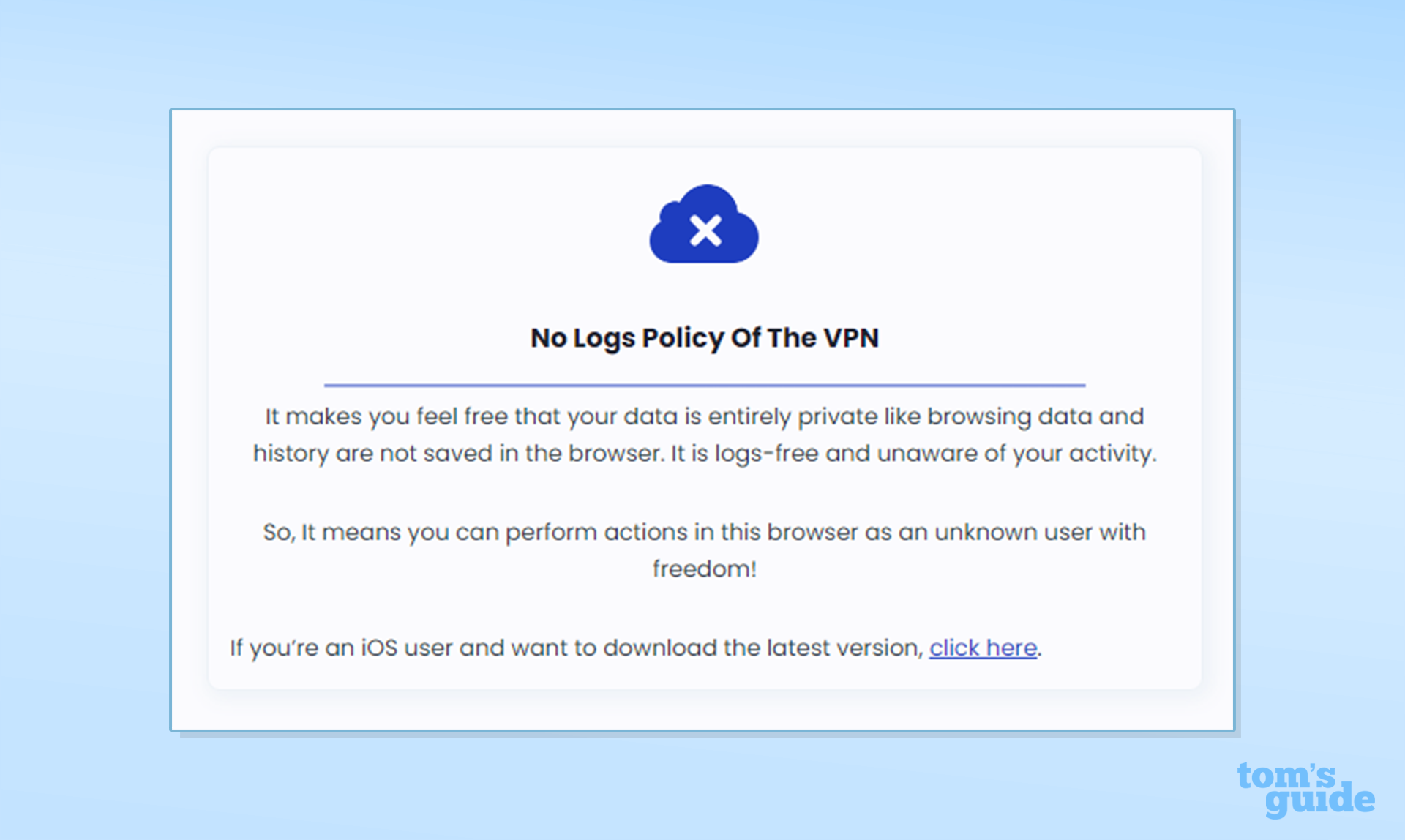
To add insult to injury, XNXubd "may share your personal information in certain situations, such as with service providers who help us analyze usage or with affiliates and business partners to offer you products or services."
If you were considering using XNXubd to improve your privacy online, I hope that this has changed your mind. I recommend not going anywhere near this app – it's taking your data and doing who knows what with it.
XNXubd's bunting of red flags
So, we've established that XNXubd misrepresents its policy by saying that it's a no-logs VPN, collects your data, may sell it on to third parties, and basically should never, ever be trusted. If that's not enough for you, though, there are plenty of other red flags to sate your appetite.
The two websites display two different email addresses – both of which are plain Gmail addresses. This is generally a quick identifier of a scam, or at the very least a lack of professionalism at a company. Google Workspace starts at $6 a month, which is hardly a bank-breaking investment, so plain old Gmail addresses aren't a great sign.
This lack of consistency and traceability adds to how sketchy XNXubd comes across. If you were using a product that collected your data and it was clearly developed by, say, Microsoft, it wouldn't be ideal but Microsoft could be held accountable for the handling of your data. Here, though, there are no links back to a real person or company to be found.
Despite claims of strong encryption, there are no details about what protocols are used anywhere on either website. Even the weakest of legitimate VPN providers use OpenVPN or WireGuard and boast about it, so the lack of any information at all here is worrying. There's also a distinct lack of any other typical VPN content – no mention of a kill switch, no list of server locations, not even a few screenshots of the app in action.
Finally, I find it rather ironic that in a troubleshooting video on YouTube – published a couple of weeks before this article – the creator uses Google Chrome to browse the website rather than XNXubd Browser VPN. If the developer doesn't want to use their own browser, I don't think you do, either.
What are the alternatives to XNXubd?
It's clear that XNXubd's popularity stems from its ability to unblock websites, and the fact that it's free to use. According to Google Trends, the majority of XNXubd's search volume comes from Cambodia, Myanmar, Indonesia, and Pakistan – relatively low-income countries in the grand scheme – so premium services like NordVPN, ExpressVPN, and even cheap VPN services like Surfshark may be out of reach for many.
However, there are some excellent free VPN services out there, with PrivadoVPN Free and Proton VPN Free being the best. If you're considering downloading XNXubd, I strongly encourage you to try one of these first. They're free, have excellent privacy features, and unlike XNXubd, will not collect your IP address or your browsing history in order to sell them to third parties.
If you're looking to unblock sites and want to maintain your privacy online, do not download XNXubd – you can do so much better.
Disclaimer
We test and review VPN services in the context of legal recreational uses. For example:
1. Accessing a service from another country (subject to the terms and conditions of that service).
2. Protecting your online security and strengthening your online privacy when abroad.
We do not support or condone the illegal or malicious use of VPN services. Consuming pirated content that is paid-for is neither endorsed nor approved by Future Publishing.
Sign up to get the BEST of Tom's Guide direct to your inbox.
Get instant access to breaking news, the hottest reviews, great deals and helpful tips.

Mo is VPN editor at Tom's Guide. Day-to-day he oversees guides on the best VPNs, privacy, and cybersecurity content, which includes making sure all his recommendations are up to date, accurate, and as useful for the reader as possible. He's a daily VPN user himself – typically NordVPN, but he enjoys a variety – and as a digital privacy advocate he believes that every step should be taken to protect yourself online.
